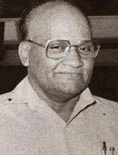by T. Sabaratnam, October 19, 2003
Volume 1, Chapter 12
Original index of series|
Chapter 13: Militants come to the Fore
Jayewardene’s media attack on Amirthalingam, the police rampage in Jaffna and the 1977 riots had the combined effect of pushing the Tamil moderates aside and brought the militants to the fore. Jayewardene’s expectation that Tamil people would be frightened failed, though it succeeded to some extent with Amirthalingam and the TULF leadership.
The TULF participated in several conferences the government called to deal with the Tamil people affected by the riots. It made use of those meetings to raise the problems concerning government servants affected by the disturbances. Jayewardene readily agreed to accommodate TULF concerns.
The TULF attended the Jaffna District Agricultural Committee meeting held on 18 December 1977 at the Jaffna Secretariat which was presided over by Trade Minister Lalith Athulathmudali. The TULF waived its decision to boycott the meetings attended by ministers for this purpose. When that decision became known, the youths were boisterous. They pasted posters condemning that decision all over Jaffna town. They threatened to demonstrate opposite the Jaffna Secretariat. Police protection was provided to Tamil leaders to enable them to move around in Jaffna, denoting the fall of the influence of the moderates in Jaffna.
I was in Jaffna to cover Athulathmudali’s visit. I reported Amirthalingam’s eloquent speech extensively in the Daily News.

A. Amirthalingam
He said: It is the duty of the Tamil community to extend its support to Prime Minister J. R. Jayewardene and enable him to solve the many problems that the community faces. The Prime Minister has assured us that he will solve them in a just and fair manner. He should be given a fair chance. Goodwill is a vital commodity today. This is being extended to the government in full measure. I hope the government will translate its promise into action.”
The TULF extended this policy of cooperation in parliament also. Amirthalingam told parliament on 21 December 1977: An opposition’s role is not to oppose everything. They have to criticize whatever they thought was wrong, support whatever they thought was right and give their suggestion on the manner the administration should be carried on.”
On 26 December, he told me in a special interview to the Daily News, “This is not a new stand. The TULF election manifesto itself had declared its support to a peaceful solution to the problems.”
Jayewardene was pleased with that far-fetched interpretation Amirthalingam gave to the TULF election manifesto.

Jayawardene
That was what he wanted the TULF to do, to lend him credibility in the eyes of the international community, to be looked on as a reasonable leader who treated the Tamil minorities with justice and fairness. He declared in January 1978 that he would take steps to solve the problems of the Tamils, whatever the consequences. This made the TULF to further soften its stand towards the government. It did not organize the usual black flag demonstration on 4 February 1978, the thirtieth anniversary of independence. It said it had decided to forgo the demonstration because Jayewardene, on whom it had placed great trust, was taking his oath as the Executive President on that day. Jayewardene took this office of Executive President by amending the 1972 constitution. On 22 April 1978, TULF went a step further and decided to serve in all standing committees of parliament.
Militants followed these developments with extreme irritation.